Text
“I was always hungry for love. Just once, I wanted to know what it was like to get my fill of it — to be fed so much love I couldn’t take any more. Just once.”
— Haruki Murakami
402 notes
·
View notes
Text
Me: so THAT'S how I fix that plot hole
My friends who watched me concernedly while I was staring into nothingness for ten minutes: ???
594 notes
·
View notes
Note
How can I write a guy's POV if I'm a girl?
Try this: http://inkandquills.com/2015/02/25/how-to-write-from-a-guys-pov/
I personally do my best to be a fly on the wall around guys and just listen to how they talk and watch how they behave. What matters most about any character is what they care about first. Do they think first about others? Themselves? The rules? Their interests? Your interests? What you think of them? How they can appear better than you?
128 notes
·
View notes
Text
you know when you’re writing and you think you’ve got the plot figured out, but then you write some more sentences, introduce a couple new characters, and suddenly you’re catapulted into the solar system, explodes like a supernova, gets sucked into a blackhole and slingshotted far beyond the observable universe
639 notes
·
View notes
Text
Basic Writeblr Etiquette
This is a guide of what I personally consider to be considerate and polite. While I would encourage people to follow this, it is just my personal opinion — it’s not a rule by any means, and it’s certainly not exhaustive.
Don’t add people to your tag lists without explicit permission.
Tag list — A tag list is a list of users who will be tagged in every post that a Writeblr makes about a certain WIP. It is often included at the bottom of a post, and people are free to ask to be included, or removed from it.
I get it, we all want people to see and enjoy our writing. However, please do not add anyone to your tag lists if they have not given you permission to.
I believe that all tag lists should be an ‘opt-in’, where people request to get put on it. While you might be willing to take someone off of a tag list with no hard feelings whatsoever, it can be really awkward for people to request to be taken off.
There are a lot of reasons why people don’t want to be on tag lists, and it doesn’t mean that they don’t like your writing. Even if someone is consistently interested and is commenting a lot, don’t add them without permission! Try asking them first!
If you reblog an ask game from someone, send them an ask.
Isn’t it really frustrating when you’re doing an ask game and about 20 people reblog it, but you only get 1 ask? We’ve all been there.
Send them an ask if you reblog! It takes like 2 seconds, and you don’t have to be particularly interested in the answer — it gives the person an opportunity to talk about their WIPs and OCs either way, and you’ll make their day.
If you want people to send you asks, try starting by sending other people some!
Use a “Read More” when you have long posts.
We writeblrs tend to make long posts, especially if we post our writing online. While that’s perfectly fine, there’s often a lot of scrolling to be done when the ‘read more’ isn’t used, especially if it gets reblogged a lot.
If you have several pictures, or your post requires quite a bit of scrolling to get through, please use the ‘read more’.
Use trigger warnings for sensitive topics.
If you are posting about sensitive topics including but not limited to things like rape, suicide, assault, etc., please use trigger warnings. Not everyone might want to see writing involving sensitive topics, and it might catch some people really off-guard, even if they’re fine with it. It’s just considerate to give your followers a heads-up, so they can decide if they want to continue or not.
Trigger warnings should be at the top of your post, or at the very least, before your sensitive content so people can see. I also tag it as “tw: [sensitive topic]” so that people who have blacklisted it can avoid it.
Please hide your sensitive content behind a ‘read more’! I have seen too many posts with trigger warnings, and no ‘read more’s, making people who want to avoid it, scroll through and potentially see the sensitive content.
If you don’t have anything nice to say, don’t say anything at all.
Someone’s writing not up your alley? Really don’t like someone’s OC? That’s fine and valid, we won’t always love everyone’s writing. Just move on; unfollow them if you have to. Don’t give people unsolicited criticism if they don’t ask for it.
It can be scary putting ourselves out there. If you’re about to say something that would bother you if you received that comment, don’t say it. Just move on.
If you like it, consider reblogging it.
We all get excited when someone reblogs our posts, and we also get a little bit frustrated if people just ignore it, or like it without leaving anything else. We can all start to foster a better community by reblogging things we enjoyed instead of just liking them — support your fellow writeblrs! Reblogging other people’s posts will make someone’s day, and more people can see their awesome writing. As a bonus, people will be more likely to reblog your work too!

If you’d like to ask me for advice on writing or running a writeblr, please check out my Ask Guidelines and FAQ first.
Ask Guidelines | FAQ | Advice Masterlist
3K notes
·
View notes
Text
every writing tip article and their mother: dont ever use adverbs ever!
me, shoveling more adverbs onto the page because i do what i want: just you fucking try and stop me
248K notes
·
View notes
Text
here’s a link to a google doc that has everything you need to know and plan about your wip it’s a godsend.
118 notes
·
View notes
Text
The ‘Forced Mentorship’ Plot: an exploration
AKA: writing is hard and I really like This Type of story
You know, stories like Soul, Brother Bear, Logan, Up, Stranger Things, Gravity Falls, etc.
The: “grumpy old man forced to work with a young person and slowly softens” ☺️

Alright folks, I’m learning some things I think you guys would benefit from knowing, especially if you are going to try to write a story like this!
So, to start out: Don’t do the story arc thing.

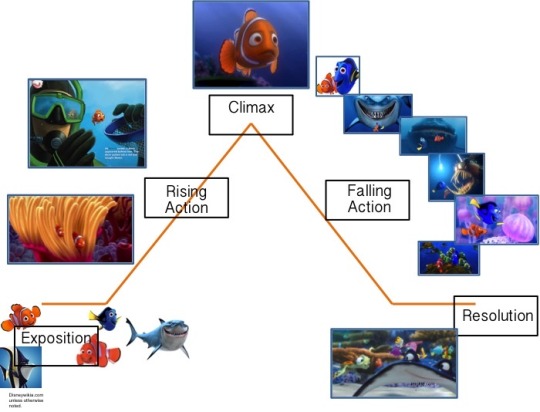
No. No, bad. It’s not as helpful for novel length stories, and it’s really easy to get things in the wrong place? Do you see how this person organized Finding Nemo? It’s completely off!
We’re using this, more,,, mountain range (?) plotline. Obviously, this isn’t the only sort of plot. But, most stories fit well in this, and it’s more helpful for a writer.

Most important are the False Hope and Low Point points, which the simpler arc doesn’t have. I’ll explain in better detail in a bit.
The Forced Mentorship Plot has a few additional points that make it specific to this type of story. I’ve got those additions in pink. You can click on it to read in detail. i know, it’s small.
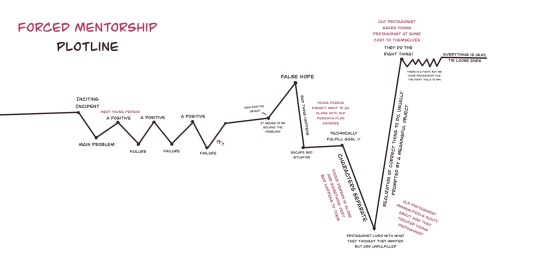
So let’s look at some examples: I have,,, a bunch. I got excited. Disclaimer: I haven’t seen some of these in a bit, so some stuff might be a little vague, but you get the idea.
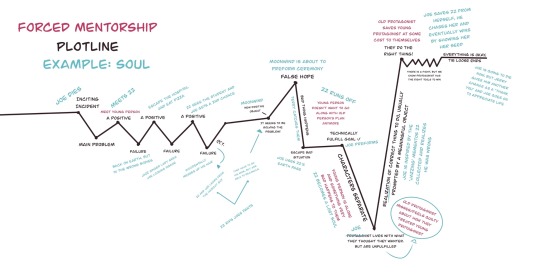
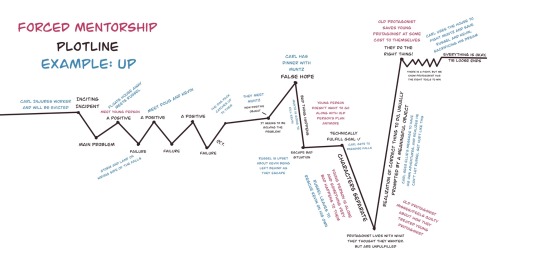
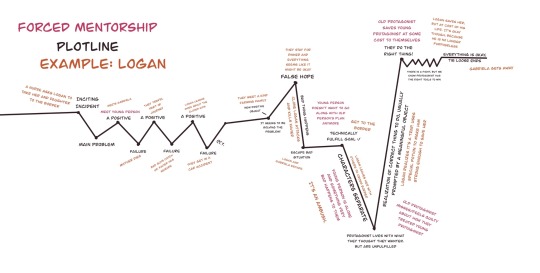
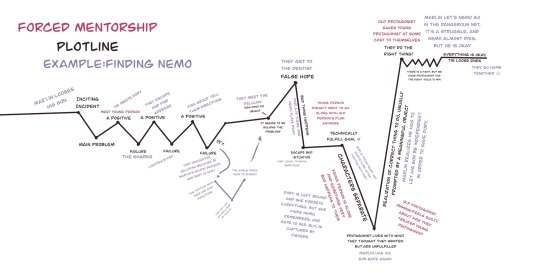
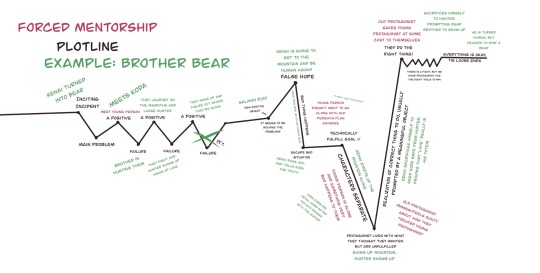
I know, I know that is way too much information. Let’s break it down.
The inciting incident:
Forced Mentorship stories force the old protagonist into a guardian-like with the young protagonist
Soul: joe dies and has to work with 22 to get an earth pass
Brother bear: kenai is turned into a bear and has to work with Koda to get to the mountain
Up: Carl’s house floats off to the wrong place, and Russel is on the porch. He has to work with Russel to get to Paradise Falls
Rising action
The characters have various adventures as they journey somewhere. Positive things work toward solving the problem
The FATAL FLAW of the older character will cause most of the problems, at the expense of the younger protagonist. For example: marlin refuses to take risks, and will not go through the scary trench. As a result, they run into jelly fish and Dory is hurt. Every short sighted decision that the older protagonist makes as the Older One, results in getting further from the goal, and hurting the younger person physically or emotionally
False hope
This is also called the Mid Point in the rising action. Here, older protagonist is introduced to a new Very positive element that seems like it is going to solve their problem.
Soul: they get to Moonwind. He has the elements set out to put them in their bodies.
Logan: they stay the night with a kind farmer and his family after a car accident, and things seem safe
Finding Nemo: the pelican knows Nemo!
Immediate Very bad consequence
This is the worst thing to happen so far in the story. The thing they thought would help is actually harmful. At this point, usually several bad things happen at once.
Up: muntz is evil and wants to kill the bird Kevin. Russel is upset at Carl
Soul: 22 runs off. Terry catches up to them
Logan: the bad guys catch up to them, Xavier is killed
Temporary escape and achieving the original goal
The protags will manage to get out of immediate danger, but at this point, the younger protagonist realizes they don’t want to go with the plan of the older protagonist any more, they strike out on their own. Meanwhile, the older protagonist finally gets what they wanted
Up: Russel leaves to get Kevin
Brother bear: Koda learns that Kenai killed his mother, and he runs off. Kenai starts up the mountain
Logan: they reach the border and Gabriela goes with the others cross the border
Finding Nemo: Marlin returns to the ocean, thinking his son is dead, and starts home, leaving Dory behind
Low Point
Older protagonist has what they wanted, but at the cost of their relationship with their new friend. They find this new life meaningless, actually
Soul: joe preforms and is unsatisfied after
Logan: he’s alone now, like he thought he needed to be
Up: Carl gets to Paradise Falls
Realization
older protagonist comes to a realization, prompted by a symbolic object previously introduced, and they choose to do the right thing, change their ways, and save the younger protagonist.
Their choice will cost the older protagonist everything, but they will give it willingly for the younger protagonist.
Soul: joe is inspired by 22’s collection of items every time she saw someone ‘jazzing’ and realizes that life isn’t about a ‘thing’ you do, but just living. He was wrong about 22
Brother Bear: kenai fights and sacrifices himself to save koda, who he loves.
Logan: Logan realizes it’s a trap and takes the serum to be stronger so he can save Gabriela, killing himself in the process.
There is a final big fight, but we’re not worried anymore. They are going to win. In the end, loose ends are tied, and the mentor becomes and Actual mentor to the young person
Some notes:
the older protagonist is different from the typical ‘mentor’ archetype in a few ways. The ‘mentor’ is the main character, not the young character. The story cannot go on once the older character is dead So, the mentor doesn’t die to ‘spur on’ the younger character. Like Obi-Wan, for example. Obi-Wan is not a forced mentor character. If he Was, the story would probably have to Start from his point of view, and End at his death, which would somehow fulfill his flaw.
Alright. So yeah, that’s my research on the Forced Mentorship sort of story.
4K notes
·
View notes
Text
The Minimalist Character Sheet
So I am not the biggest fan of those ten page character sheets that include 100 questions like “What’s their favourite ice cream?”. Don’t get me wrong: If those help you with your writing, more power to you! Do what works for you. But I tend to discover all the little details of a character while writing. I only need the fundamental things. Maybe this works for you too!
The Basics
Name: including all nicknames, titles, etc.
Gender
Age
Role in the Narrative
Physical Description: focus on defining features
GMC (If you want to learn more about the concept, check out this post.)
Internal Goal
Internal Motivation
Internal Conflict
External Goal
External Motivation
External Conflict
Personality
Short characterization: internal personality and external behavior
Their biggest failure/issue/flaw: and how it impacts their life/personality/behavior
Backstory: and its consequences, such as triggers
Speech pattern: at least three speech marks that emphasize their personality (if you want to learn more about speech patterns, check out this post)
Behaviour pattern: at least three habits that emphasize their personality
Character Arc: where do they start, how do they change, where do they end?
That’s it! Hope this gave you some pointers on how to start out with character creation.
Have fun writing!
2K notes
·
View notes
Text
Tips if you're struggling to write or are feeling discouraged!
Figure out where you write best! For example I found out that I can only really write and focus when I write on a desktop computer at a desk. I can write on a laptop but I succumb to distractions much easier and like having a larger screen. Maybe you do better with a laptop or even pen and paper.
Know what environment you write best in! I do my best work when its quiet and calm and inside. I cant focus with music or if someone is in the room watching a loud video or something. Maybe you do best listening to music or with someone to bounce ideas with. Maybe it's in your bed or on the couch or even outside. Move around and see what works best.
READ! I used to be a big reader in middle and high school until I graduated and went to college. I also worked full time and didnt want to waste my limited personal time reading. It was much easier to just watch a show on TV. So if you're like me it might take some time to get back into it but I promise it helps. I found it easier to get back into reading by finding people who write similar to my own writing and then branch out to other styles. I also found I really can only read hardcover books. Dont know why but the odds of me reading and finishing a book are higher when its hardcover. Reading makes writers better and is recommended by many authors such as Stephen King.
Don't believe you have to write every day! Just like the saying absence makes the heart grow fonder sometimes the best thing to do when you hit a wall is to just stop writing and take a rest. Do that thing all writers love and just think about your story or don't! Taking time away from your story can help you come back to it refreshed and excited to start again.
Don't beat yourself up for not writing large chunks of story every time. If all you can write is a paragraph then all you can write is a paragraph. Some days you may be able to pop out 10 pages others barely a page. All that matters is you sat down and wrote something.
Stop discouraging yourself for choosing yourself over writing. Chances are you arent a writer full time and have to work and go to school. Maybe you have kids or obligations that take time and energy. Life happens and it takes a lot out of you. If writing is making you stressed or even depressed similar to a normal job then stop. Take the time you need to feel better and come back to it when you're ready. Writing is HARD. And it takes a lot more effort and energy then most people think. Writing should be a fun and exciting thing but if you arent getting anything positive from it then its okay to stop and take care of yourself.
Encourage yourself and other writers! We're all in the same boat and we're all evolving and getting better at the art. Not everyone has supportive friends and family to cheer them on and give encouraging feedback. Help each other out and let someone know if you like their work. It may be what they need to keep on going and improving.
3K notes
·
View notes
Text
been trying to write on this one book idea I had for so long, now I am writing, when my finals are coming up and I need to focus on studying !
i feel the most motivated to make my life fall apart and get sad and emotional to write about it.
1 note
·
View note
Text
Writing Tips Masterlist
Last updated April 9, 2021.
World-Building
4 Tips for Writing Magic
Creating a Culture
Totalitarian Governments
Creating a Distinct World
Creating (Fictional) Medicine
Describing New Settings
Writing a War
Writing a War with Superheroes / Magic / Fantasy
70 Questions for World-Building
Creating Superstitions
49 Questions for Creating a Religion
The Tie Between Characters and World-Building
34 Questions for Creating a Government
36 Questions for Music in World-Building
Creating a New Species
42 Questions for Creating an Education System
Characters
Developing Character Appearance
Developing Character Personality
Multilingual Characters
Creating a Wardrobe
How to Name Your Characters
Your Characters vs. Already-Established Characters
Effective Point-of-View Character
Writing an Impactful Death
Writing with Archetypes
Designing Your Characters
Mute Characters
Thinning Your Cast
Not Enough Characters?
84 Questions for Developing Plot and Character Roles
Sexuality without a Relationship
Consistent Personalities
Skills and Knowledge
Creating Conflict
Character Arcs
Sympathetic Characters
Name vs. Pronouns and When to Use Them
Creating Character Voice
Characters Who Are Learning Another Language
Character Fears
Finding Motivations
Creating Character Flaws
Emotionless Characters
Relationships
Dynamic Relationships
Sibling Relationships
Believable Romance
Characters Who Don’t Know How to Relationship
Complementary Character Traits
Writing a Slow-Burn Romance
Characters Who Fall Out of Love
Groups of Characters
Making Compatible Characters
Emotions
Frustration
Grief
Fear
Planning & Plotting
Planning a Series
Writing an Outline
Tips for Writing Subplots
Non-Point-of-View Romantic Subplots
Avoiding Generic Plots
Planning and Pace
Editing & Prose
Writing with Emotion
Controlling Pace with Detail
Steps of the Editing Phase
Descriptions in Context
Imagery
Dialogue
Showing vs. Telling
What is passive voice?
Reworking Moments of Exposition
Adverbs
When to Cut Your Content
Avoiding Cliches in Your Story
The Importance of Vocabulary
Writing Beginning Paragraphs
Motivation
How to Balance Multiple Projects
How to Fall Back in Love with Your Story
Writing Every Day?
Sticking with Your Story
Getting (Back) Into the Writing Habit
Setting Realistic Goals
Shiny New Idea Syndrome
Positive Writing Mindset
Staying Motivated on Your Projects
Getting in “The Zone”
Keeping Writing Logs
Avoiding Burnout
Breaking Out of Writer’s Block
Scenes
Quick Decisions
Travel Scenes
Breakdown in the Shower
General Writing & Miscellaneous
The Joys of the First Draft
Injuries
Creating Suspense
Writing Poison
Prophecies
A Word to Young Writers
Making a Moodboard
Consuming with the Producer Mindset
For First-Time Writers
Building Your Writing Skill
Advice for Student Writers
How to Do Research
How to Maximize Your Writing Time
How to Make Your Book Look Like a Book
On Experimenting in Writing
When to Use Multiple Points of View
Building Theme
Becoming a Beta Reader
Background Music While Writing
Why Committing to a Project Can Be Stressful
Warm-Ups for Writers
Determining Your Story’s Genre
Why do we get stressed when we don’t write?
Writing Short Stories
If my work helps you or your writing, please consider supporting me my joining my Patreon!
3K notes
·
View notes
Text
Reblog if it’s ok if I tag you in tag games
I don’t have nearly enough people to tag and I don’t want to tag the same few people, so reblog to let me know if it’s alright! It’ll probably be mostly writing tag games and I need/want to get to know more writers so this knocks out two birds with one stone.
537 notes
·
View notes
Text
Writing Tips Masterlist
Last updated April 9, 2021.
World-Building
4 Tips for Writing Magic
Creating a Culture
Totalitarian Governments
Creating a Distinct World
Creating (Fictional) Medicine
Describing New Settings
Writing a War
Writing a War with Superheroes / Magic / Fantasy
70 Questions for World-Building
Creating Superstitions
49 Questions for Creating a Religion
The Tie Between Characters and World-Building
34 Questions for Creating a Government
36 Questions for Music in World-Building
Creating a New Species
42 Questions for Creating an Education System
Characters
Developing Character Appearance
Developing Character Personality
Multilingual Characters
Creating a Wardrobe
How to Name Your Characters
Your Characters vs. Already-Established Characters
Effective Point-of-View Character
Writing an Impactful Death
Writing with Archetypes
Designing Your Characters
Mute Characters
Thinning Your Cast
Not Enough Characters?
84 Questions for Developing Plot and Character Roles
Sexuality without a Relationship
Consistent Personalities
Skills and Knowledge
Creating Conflict
Character Arcs
Sympathetic Characters
Name vs. Pronouns and When to Use Them
Creating Character Voice
Characters Who Are Learning Another Language
Character Fears
Finding Motivations
Creating Character Flaws
Emotionless Characters
Relationships
Dynamic Relationships
Sibling Relationships
Believable Romance
Characters Who Don’t Know How to Relationship
Complementary Character Traits
Writing a Slow-Burn Romance
Characters Who Fall Out of Love
Groups of Characters
Making Compatible Characters
Emotions
Frustration
Grief
Fear
Planning & Plotting
Planning a Series
Writing an Outline
Tips for Writing Subplots
Non-Point-of-View Romantic Subplots
Avoiding Generic Plots
Planning and Pace
Editing & Prose
Writing with Emotion
Controlling Pace with Detail
Steps of the Editing Phase
Descriptions in Context
Imagery
Dialogue
Showing vs. Telling
What is passive voice?
Reworking Moments of Exposition
Adverbs
When to Cut Your Content
Avoiding Cliches in Your Story
The Importance of Vocabulary
Writing Beginning Paragraphs
Motivation
How to Balance Multiple Projects
How to Fall Back in Love with Your Story
Writing Every Day?
Sticking with Your Story
Getting (Back) Into the Writing Habit
Setting Realistic Goals
Shiny New Idea Syndrome
Positive Writing Mindset
Staying Motivated on Your Projects
Getting in “The Zone”
Keeping Writing Logs
Avoiding Burnout
Breaking Out of Writer’s Block
Scenes
Quick Decisions
Travel Scenes
Breakdown in the Shower
General Writing & Miscellaneous
The Joys of the First Draft
Injuries
Creating Suspense
Writing Poison
Prophecies
A Word to Young Writers
Making a Moodboard
Consuming with the Producer Mindset
For First-Time Writers
Building Your Writing Skill
Advice for Student Writers
How to Do Research
How to Maximize Your Writing Time
How to Make Your Book Look Like a Book
On Experimenting in Writing
When to Use Multiple Points of View
Building Theme
Becoming a Beta Reader
Background Music While Writing
Why Committing to a Project Can Be Stressful
Warm-Ups for Writers
Determining Your Story’s Genre
Why do we get stressed when we don’t write?
Writing Short Stories
If my work helps you or your writing, please consider supporting me my joining my Patreon!
3K notes
·
View notes
Text
The Three-Act Structure and Tentpole Events
Or, how I re-outline a first draft using the Tentpole Method
If you’re anything like me, your first drafts are messy, and the events are a bit all-over-the-place. Editing/rewriting the first draft takes a lot of time and patience, but before you can dig into that you have to give your manuscript some sort of structure. Personally, I like to use the three-act structure.
The Three Act Structure
Act One (the first 25%)
Exposition
This is the everyday life of the protagonist. The status-quo, as some call it. It shows how things are before they get pulled into their story.
Ex. Bilbo Baggins in the Shire
The Inciting Incident
This is the event that drags the character into the story.
Ex. Gandalf and the Dwarves showing up at Bilbo’s house
The First Act Climax: The Point of No Return
A climax is the most tense/exciting event of an Act. The first-act climax should bring all the issues the character has been facing together. While the inciting incident drags the character into the story, the first act climax leaves them unable to go back to the status quo; now they have no choice but to continue on the story’s path.
Ex. Bilbo leaves with the party
Act Two (the middle 50%)
Here, the character should face a series of obstacles that prevent them from reaching their goal
Ex. Bilbo faces the trolls
The Midpoint Twist
The midpoint twist can be a change that happens to the story, or it can be a major plot twist. Something that is not as it seems comes into a new light and alters the fabric of reality, or the characters make a discovery about themselves, or the top suspect is murdered, or the villain turns out to be a good guy, etc. After this point, everything is different.
Ex. When Bilbo finds the ring
The Second Act Climax
The second act climax should be more tense/exciting/have higher stakes than the first act climax.
Ex. The dwarves are captured by spiders, and Bilbo saves them
Act Three (the final 25%)
By now, every moment should propel the characters closer to the climax. There are a few final obstacles for the characters to face before they reach the final battle. They prepare for the impending storm (if they can).
Ex. Smaug attacks Lake Town
The Climax
The Third Act Climax is the most tense moment of the story. This is the thing the characters are fighting for, this is the final battle, this is the moment everything rests upon. The events of the climax itself rely on what kind of story it is. A mystery will have the murderer finally revealed, a romance will have one lead rush to the airport to stop the other’s flight, etc.
Ex. The battle of the five armies
Denouement
This is life after the big, world-altering event that is the climax. Though the story is over and things are back to normal, the events of the story means the characters’ lives are changed. For better or for worse, they can never truly return to the status quo.
Bilbo returns to the Shire
For how this relates to what I call the tentpole method, look below the cut. :)
Keep reading
876 notes
·
View notes
Text
A Character Journey in 4 Steps
Establish the Struggle: Convey your character’s core emotional struggle near the beginning of your story.
Push your Character with Plot: Use the plot points of your story to push your character to confront their struggle incrementally — making small realizations and victories, having setbacks, making progress again, and so on.
Build to a Moment of Crisis: Continue pushing your character until they reach a moment of emotional crisis, where they’re forced to either overcome their struggle or succumb to it.
Demonstrate the Change: After the crisis (which is often the climax), have your character take an action that demonstrates their change.
Here’s what that looks like in an outline:
1. Establish the Struggle
Sara is a talented singer-songwriter who’s always lacked confidence; but now, after an envious boyfriend/co-writer tore her down during a messy breakup, she’s lost nearly all confidence. She no longer performs in front of crowds or writes music.
2. Push your Character with Plot
Late one Saturday night, Sara goes to her college’s empty music hall, sits at a piano, and sings a song she wrote before the breakup. Katherine, a music student who’d fallen asleep drunk in a nearby practice room, wakes up, barges in, and scares Sara off as she tries to tell her how great she sounds.
Katherine runs into Sara again on campus and apologizes for scaring her. She asks a bunch of questions, and Sara admits she used to write music. Katherine asks to hear more of her work, but Sara refuses.
Sara gets cornered by Katherine in the music hall on another Saturday night, but Katherine has a new tactic: she asks Sara to help her finish a song she’s been working on. Sara tentatively agrees.
Katherine performs the song they wrote together at an open mic, and the crowd loves it. Sara seems to gain some confidence, but refuses to admit her capabilities.
Still, later that night, alone in her apartment, she grabs her roommate’s out-of-tune guitar from the closet (Sara had sold her own) and starts playing around with a new song.
A week later, Sara shows the song to Katherine, and Katherine loves it. She records the performance on her phone, shows Sara how happy she looks performing, and convinces her to join her at an open mic.
They perform together in front of a small crowd. It goes well. As the story progresses, maybe there’s drama with the ex-boyfriend, maybe there’s romance with Katherine, etc., etc. But wherever the story goes, everything continues to push Sara forward (with maybe a few temporary steps back) on her journey to overcome her struggle.
3. Build to a Moment of Crisis
Sara has come a long way in regaining her confidence, now writing and performing regularly. But that confidence is still fragile.
The college’s end-of-year talent show arrives, and Sara and Katherine perform together. In the final round, Katherine surprises Sara by backing off the stage and having her sing her original song alone. Sara begins the performance beautifully, but then some drunk guys in the front row distract her, she fumbles, and the song falls apart.
Sara runs offstage, mortified and angry at Katherine — vowing to never do any of this again. But then, someone from the crowd approaches and tells her how much the song connected with them, and that makes Sara pause.
4. Demonstrate the Change
Katherine doesn’t hear from Sara for two weeks. She fears she’s given up on music. But then she goes to a local bar for open mic night, and there’s Sara onstage — with a guitar in hand and a nervous, but determined, smile.
Parting Notes
You can show a character’s journey in various ways; this is just one of the clearer, more straightforward methods. It’s also pretty effective. :)
When using this approach, be careful not to oversimplify complex issues (such as mental illness) by using the “crisis” as an overly simplistic fix/cure. Always give the subjects of your story the depth and complexity they deserve.
Remember, life is an ever-continuing journey, so if you write a multi-book series, you can use this structure repeatedly to continually evolve your character. For example, in my own WIP, the main character’s arc is a long, complex one, so I’m running him if through this process in each book to bring him incrementally closer to his full realization.
— — —
Your stories are worth telling. For tips on how to craft meaning, build character-driven plots, and grow as a writer, follow my blog.
777 notes
·
View notes
Text
Embrace “good enough” with your writing. Don’t shoot for “perfect”. Don’t try to “be the best you can be”. Setting really high standards is very hard on you and your creativity. It’s like running a marathon at top speed ALL THE TIME. It’s exhausting. It causes strain. And eventually you will grind to a dead halt with a complete aversion to continuing.
So give yourself and your writing some grace today. Let your writing be “just okay”. Challenge yourself to view your creativity in a different light or with a different angle. Aim for the elegance found only in simplicity. See how it transforms your creativity and brings you the joy you had when you first fell in love with writing.
2K notes
·
View notes